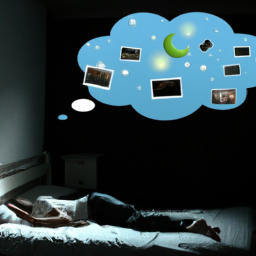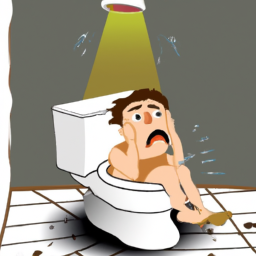Have you ever experienced a dream that materialized in real life? It’s a strange and eerie feeling that is hard to put into words. I have personally encountered this phenomenon, sparking my fascination with the power of the subconscious mind and the idea of psychic abilities.
In this article, I’ll explore the phenomenon of dream predictions and the various theories that attempt to explain why our dreams sometimes seem to come true.
While some people dismiss the idea of dream predictions as mere coincidence, others believe that our dreams are a powerful tool for tapping into our intuition and even glimpsing the future. As someone who has had multiple experiences with dreams that later became reality, I’m fascinated by the different perspectives on this topic.
Whether you’re a skeptic or a believer, there’s no denying that the phenomenon of dream predictions is a fascinating and mysterious aspect of the human experience. Let’s dive in and explore some of the theories behind why our dreams sometimes come true.
Key Takeaways
- Dreams have a profound impact on people’s lives and can serve a purpose beyond entertainment.
- Paying attention to emotions in dreams can provide insights into our inner selves.
- Precognition, the theory that dreams can predict future events, challenges our understanding of time and may be explained by quantum physics.
- Cultural background and personal experiences influence our perception of dream predictions, and keeping a dream journal can help identify recurring symbols and themes for deeper understanding.
The Phenomenon of Dream Predictions
Do you ever have dreams that seem to predict the future and leave you wondering how it’s possible? It’s a phenomenon that’s been reported by people all over the world, and it’s been the subject of countless studies and research.
Some people believe that this ability to predict the future through dreams is a gift, while others believe that it’s simply a coincidence. The truth is, nobody really knows for sure why some people are able to predict the future through their dreams.
Some scientists believe that it has to do with the brain’s ability to process information during sleep, while others believe that it’s a result of a heightened state of awareness during the dream state. Regardless of the reason, it’s clear that this phenomenon is real and can have a profound impact on people’s lives.
So, what is the role of the subconscious mind in all of this?
The Role of the Subconscious Mind
Your subconscious mind is like a vast ocean, constantly churning and shaping your thoughts and actions without you even realizing it. It’s responsible for processing all the information that you come across on a daily basis, from the things you see and hear to the emotions you feel.
It’s no wonder that it plays a crucial role in the phenomenon of dream predictions. When you dream, your subconscious mind is free to roam and explore without the limitations of your waking life. It has access to all the information that you have stored in your memory, and it can make connections and associations that your conscious mind would never be able to.
This is why dreams can be so insightful and why they often contain messages that can help you navigate your waking life. These messages are not always easy to interpret, but with practice, you can learn to understand the language of your subconscious mind and use it to your advantage.
This is where the power of intuition comes in, and it’s the topic of the next section.
The Power of Intuition
Feeling a gut instinct is a natural and powerful way to tap into your intuition and make decisions that align with your inner guidance. Many people believe that intuition comes from our subconscious mind, where our deepest desires and fears reside.
It’s like a voice that whispers to us, guiding us towards the right path or warning us of potential danger. Intuition can also manifest in the form of vivid dreams or premonitions. Sometimes, we have a dream that feels so real and vivid that it’s hard to shake off.
And then, a few days or weeks later, the dream comes true in real life. These experiences can be unsettling, but they also show us the power of our intuition and the mysterious ways in which our minds work.
This leads to the possibility of psychic abilities, which we’ll explore in the next section.
The Possibility of Psychic Abilities
Psychic abilities, such as clairvoyance and telepathy, have been a topic of fascination and controversy for centuries. Some people believe they possess these gifts and can use them to predict the future or communicate with others without speaking. While there’s no scientific evidence to support the existence of psychic abilities, some individuals claim to have experienced them firsthand.
Here are some examples of psychic abilities that people claim to have:
- Precognition: the ability to see future events before they happen
- Psychokinesis: the ability to move objects with the power of the mind
- Mediumship: the ability to communicate with spirits of the deceased
- Remote viewing: the ability to see places and events that are far away, without being physically present
- Aura reading: the ability to perceive a person’s energy field and gain insight into their emotions and thoughts
While some people may dismiss these claims as superstition or wishful thinking, others remain convinced that psychic abilities are real.
In the next section, we’ll explore the scientific explanation of dreaming and how it relates to the possibility of dreams coming true.
The Scientific Explanation of Dreaming
I’ve always been fascinated by the function of dreams and what they may reveal about our subconscious mind.
From my research, it appears that one of the primary purposes of dreaming is to consolidate memories and process emotions.
The relationship between dreams and emotions is particularly intriguing, as dreams can often reflect our deepest fears, desires, and anxieties.
To summarize, dreaming serves as a mechanism for our brains to work through and make sense of our experiences and emotions.
The Function of Dreams
You may have heard that dreams serve a purpose beyond just entertainment – they actually have a function in our lives. Dreams are believed to help with problem-solving, emotional processing, and creativity.
Dreams can help us come up with solutions to problems we may be facing in our waking lives. By allowing our minds to work through different scenarios and possibilities, we can often come up with new ideas and solutions.
Dreams also provide a space for us to process and work through our emotions. They can help us confront and deal with difficult emotions that we may be avoiding in our waking lives.
Finally, dreams can inspire creativity by allowing us to explore new ideas and perspectives. Many famous artists, writers, and musicians have credited their dreams with inspiring some of their greatest works.
The role of memory consolidation is another important function of dreaming. During sleep, our brains consolidate and strengthen memories from the previous day. Dreams may play a role in this process by helping us to prioritize and categorize new information.
Overall, it’s clear that dreams serve an important function in our lives beyond just being a source of entertainment.
The Role of Memory Consolidation
As I mentioned before, one of the primary functions of dreams is to aid in memory consolidation. During sleep, our brains work to transfer new information from short-term memory to long-term memory, and dreams are thought to play a crucial role in this process.
Studies have shown that people who are deprived of REM sleep (the stage of sleep during which most dreaming occurs) have more difficulty with memory retention and recall. This connection between dreams and memory has led some to hypothesize that dreams may also have a predictive function, especially when it comes to personal experiences.
It’s possible that our brains use dream imagery to help reinforce memories that are particularly salient or emotionally charged, potentially helping us to better anticipate or navigate similar situations in the future. However, the relationship between dreams and the future is still largely speculative, and there’s no solid evidence to suggest that dreams can definitively predict what’s to come.
While the role of memory consolidation in dreams is fascinating, it’s also important to consider how dreams can impact our emotions and vice versa.
The Relationship Between Dreams and Emotions
Immerse yourself in the emotional landscape of your dreams, where the symbols and imagery can reveal underlying feelings and help you process unresolved emotions.
Dreams often reflect our deepest emotions, fears, and desires. They can be a way for our subconscious to communicate with us, offering insights and solutions that we may not be able to access in our waking state.
By paying attention to the emotions that arise in our dreams, we can gain a clearer understanding of our inner selves and work towards resolving any emotional blockages that may be holding us back.
As we explore the relationship between dreams and emotions, it’s important to note that some people believe that dreams can also predict future events. This is known as the theory of precognition, and it suggests that our dreams may be a way of accessing information about events that have not yet occurred.
While this idea is controversial and not widely accepted by the scientific community, it’s worth considering as we continue to explore the mysteries and complexities of the human mind.
The Theory of Precognition
I find the theory of precognition fascinating because it challenges our understanding of time and how it operates.
Some proponents of the theory believe that quantum physics may play a role in explaining how precognition works.
Others suggest that precognition may be evidence of parallel universes, where events that have yet to occur in our universe are already happening in another.
Overall, it is an intriguing concept that pushes the boundaries of what we think we know about the universe.
The Concept of Time
You’re probably wondering why your dreams seem to come true, and the answer lies in the way time works. Time is not a linear concept, but rather a fluid and constantly changing dimension. This means that events in the past, present, and future are all happening simultaneously, and our perception of time is simply a way for our brains to make sense of this constant flow of information.
When we dream, our subconscious is able to tap into this non-linear aspect of time and pick up on events that have yet to occur in our waking lives. It’s like we are able to glimpse into the future, and our dreams serve as a sort of preview of what is to come.
This is why sometimes our dreams seem to come true, because they are actually glimpses of events that have yet to happen in our waking lives.
The role of quantum physics comes into play when we consider the idea that everything is connected, and that even the smallest actions can have a ripple effect on the world around us. But that’s a topic for another time.
The Role of Quantum Physics
Before getting into the role of quantum physics in my dreams coming true, let me first emphasize how time plays a crucial role in this phenomenon. As I’ve previously mentioned, time isn’t a fixed and linear concept. It can be flexible and subjective, and this is where quantum physics comes into play.
Quantum physics is the study of the behavior of matter and energy at a microscopic level. It’s been proven that at this level, particles can exist in multiple states at once, and the act of observing them can actually change their behavior. This means that the observer and the observed are intrinsically linked, and this relationship can affect the way time is perceived.
To further emphasize the role of quantum physics, here are three key points:
-
The observer effect in quantum physics means that the act of observing can change the outcome of an experiment. This suggests that our thoughts and perceptions can have a direct impact on the physical world around us.
-
The uncertainty principle in quantum physics suggests that particles don’t have a fixed state until they’re observed. This means that the future isn’t predetermined, and that possibilities exist until a decision is made.
-
Quantum entanglement is the phenomenon where two particles can be connected in such a way that the state of one affects the state of the other, regardless of the distance between them. This suggests that there could be a connection between ourselves and the world around us that we may not fully understand.
With the concept of time and quantum physics in mind, it leads to the possibility of parallel universes.
The Possibility of Parallel Universes
The concept of parallel universes, which is heavily discussed in quantum physics, suggests that there may be multiple versions of reality coexisting with our own. This theory proposes that every time a decision is made, a new universe branches off to accommodate each possible outcome. Therefore, there are infinite versions of the universe where every possible scenario has played out.
This concept can be both exciting and terrifying. On one hand, it opens up endless possibilities and allows for the potential that our deepest desires and dreams may have come true in a parallel universe. On the other hand, it also means that there are universes where our worst nightmares have become a reality. The thought of living in a world where everything went wrong can be unsettling, but it also highlights the importance of cherishing the life we have in this reality.
Coincidence often plays a role in our experiences, leading us to question whether our dreams coming true is simply a result of chance. However, the possibility of parallel universes adds another layer to this discussion, suggesting that there may be more at play than we can comprehend. Nonetheless, it is worth exploring the idea that our thoughts and actions may have an impact on the reality we experience, whether it be in this universe or in another.
The Role of Coincidence
Sometimes it feels like the universe is playing a cruel joke on us when coincidences occur that seem to confirm our dreams coming true. We may believe that our dreams are prophetic and that they hold some deep significance, but the truth is that coincidence often plays a significant role in these situations.
While there may be some scientific explanations for these occurrences, such as the ability of our subconscious minds to pick up on subtle cues that our conscious minds may not notice, it’s also possible that these events are simply a product of random chance.
That being said, it’s important to recognize that coincidence is not always a negative thing. In fact, these occurrences can often serve as a reminder that the universe is full of mystery and that anything is possible. Whether our dreams are truly prophetic or not, the fact that they sometimes seem to come true is a testament to the power of the mind and the infinite possibilities that exist in the world around us.
With this in mind, it’s important to approach coincidences with an open mind and a sense of wonder, rather than dismissing them as mere chance. This will allow us to embrace the magic of the universe and all of the incredible experiences that it has to offer.
Transitioning into the subsequent section about "the cultural perception of dream predictions,"it’s clear that our beliefs about coincidence and prophetic dreams are heavily influenced by our cultural backgrounds and personal experiences. While some cultures view these occurrences as evidence of a higher power or divine intervention, others may see them as a product of science or chance.
Regardless of our individual perspectives, it’s important to remain open to the possibilities and to continue exploring the mysterious world of dreams and their potential meanings.
The Cultural Perception of Dream Predictions
You might be surprised to learn that the way you perceive dream predictions can be heavily influenced by your cultural background and personal experiences. Here are three ways in which cultural beliefs can shape your understanding of dreams:
-
Some cultures believe that dreams are messages from the divine or ancestors, while others see them as mere random thoughts.
-
In some cultures, dreams are seen as prophetic and taken very seriously, while in others they are dismissed as meaningless.
-
The symbols and imagery in dreams can also be interpreted differently depending on cultural norms and values.
Understanding these cultural nuances is important when trying to interpret your dreams. By recognizing the influence of cultural beliefs, you can gain a more nuanced understanding of your dreams and what they may be trying to tell you.
In the next section, we’ll explore some tips for interpreting your dreams in a way that’s meaningful to you.
How to Interpret Your Dreams
I’ve always been fascinated with the meanings behind my dreams, and I’ve found that interpreting them can provide insight into my subconscious mind.
One way to start interpreting your dreams is by keeping a dream journal to record the details of each dream. This can help you identify recurring symbols and themes, which are important to analyze in order to gain a deeper understanding of your dreams.
If you’re struggling to interpret your dreams on your own, seeking professional help from a therapist or dream analyst can also be beneficial.
Keeping a Dream Journal
By noting down your dreams in a journal, I’ve found that it helps me to remember more of my dreams and to better understand their meanings.
I keep a notebook and pen by my bed every night so that I can quickly jot down any details I remember upon waking up. Even if it’s just a few words or images, it’s enough to trigger my memory later on when I have more time to write everything down.
Keeping a dream journal has also helped me to identify recurring symbols and themes in my dreams. For example, I often dream about water or drowning, which could represent feelings of being overwhelmed or emotionally vulnerable.
By analyzing these symbols and themes, I can better understand my subconscious thoughts and feelings. This has allowed me to make positive changes in my waking life, such as addressing underlying anxieties and making decisions with more confidence.
Analyzing Symbols and Themes
Exploring the recurring symbols and themes in my dreams can be a fun and insightful way to better understand my subconscious thoughts and emotions. I’ve noticed that certain objects, people, and colors appear frequently in my dreams, and they often hold a deeper meaning than what meets the eye. Here are three ways analyzing symbols and themes has helped me gain insight into my dreams:
-
It reveals my fears and anxieties. For example, I often dream about falling, which could be a symbol of my fear of failure or losing control. By analyzing this recurring symbol, I can better understand my subconscious fears and work towards overcoming them.
-
It highlights my desires and aspirations. Certain symbols in my dreams, such as flying or achieving a goal, may represent my deepest desires and aspirations. By analyzing these symbols, I can gain clarity on what I truly want and work towards making my dreams a reality.
-
It helps me process past experiences and emotions. Sometimes, my dreams include symbols or themes related to past experiences or emotions that I haven’t fully processed yet. By analyzing these symbols and themes, I can better understand the impact of these experiences and work towards healing and moving forward.
Analyzing the symbols and themes in my dreams has been a valuable tool for understanding my subconscious thoughts and emotions. However, if I’m struggling to make sense of my dreams or if they’re causing me distress, seeking professional help may be necessary to further explore these issues.
Seeking Professional Help
After analyzing the symbols and themes in my dreams, I still couldn’t find a clear answer as to why they sometimes come true. I felt stuck and helpless, so I decided to seek professional help.
I scheduled an appointment with a therapist who specializes in dream analysis. During my first session, the therapist asked me to describe my dreams in detail. She listened attentively and asked clarifying questions.
Then, she explained that sometimes our dreams can be a manifestation of our deepest fears and desires. She helped me dig deeper into my subconscious mind and understand the underlying emotions that could be causing my dreams to come true.
With her guidance, I felt more optimistic and confident about gaining control over my dreams and my life.
Frequently Asked Questions
Can dreams really predict the future?
Oh, absolutely! My dreams are always spot on with predicting the future. It’s almost as if I have some kind of superpower. But seriously, dreams are just random brain activity and have no predictive power.
Is there a way to control or influence the outcome of my dreams?
I’ve found that keeping a dream journal and visualizing positive outcomes before falling asleep can influence the content of my dreams. However, there’s no guaranteed way to control or predict their outcomes.
Are some people more likely to have prophetic dreams than others?
Some people are more likely to have prophetic dreams than others, but it’s unclear why. For instance, my friend always dreams of disasters before they happen, while I rarely have such dreams.
How do dreams fit into the concept of fate or destiny?
Dreams can provide insights into our subconscious thoughts and desires, but they do not necessarily dictate fate or destiny. Instead, they can serve as a guide to help us make choices that align with our true selves.
Can dream predictions be trusted as reliable information for decision making?
I wouldn’t rely solely on dream predictions for decision making. While they may hold some significance, they can also be influenced by our daily experiences and subconscious thoughts. It’s important to consider all factors and make informed choices.
Conclusion
In conclusion, I believe that dreams can indeed come true, but it’s not always a guarantee. There are various factors that can influence the outcome, such as the role of the subconscious mind, the power of intuition, and even the possibility of psychic abilities.
While there is some scientific evidence to support the theory of precognition, there is also a lot of room for coincidence and cultural perception. Interestingly, did you know that a study conducted by the University of California found that people who’ve experienced deja vu are more likely to believe in the predictive power of dreams?
This statistic paints a vivid picture of the connection between our experiences and our beliefs. It suggests that our past experiences can shape the way we perceive and interpret our dreams, and that our beliefs can influence the way we experience the world around us. Therefore, it’s important to approach dream predictions with an open mind and a healthy dose of skepticism.









